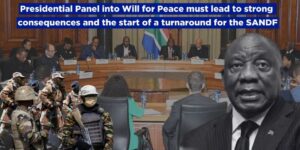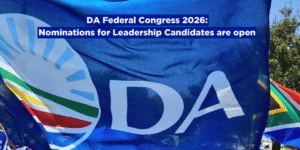In less than a week, the Democratic Alliance will hold its Federal Congress – the largest the party has ever undertaken, and arguably the most important political event for all South Africans ahead of 2024’s General Election. This is not because the DA is South Africa’s official opposition. It is because in South Africa’s current political circumstance, the DA is now South Africa’s government in waiting, and the results of the DA’s Federal Congress will likely determine the future of South Africa and our democracy.
Opinion polls conducted by the Social Research Foundation, Rapport newspaper, and even internally by the DA and the ANC have all pointed to one inevitable outcome in 2024: the ANC will lose its majority and South Africa will, for the first time ever, be facing a national coalition government. Change is on the horizon for our country, and with the DA waiting in the wings, it is the leaders whom the party elects in the coming week who will lead South Africa into a new coalition dispensation. When you look at it this way, you realise that the DA’s Federal Congress is a milestone event for South Africa, the results of which could reshape our country for generations to come. But what does the DA’s Federal Congress mean for the South African voter?
This is a very good question indeed. To answer it, one must first remember that South Africa’s political system does not permit the direct election of presidents. Rather, the political party itself determines who will lead it and voters are then given an opportunity to vote for the party as a whole. Secondly, one must look at which political parties hold elective congresses, how they are undertaken, and what interests are represented in the internal election. This is especially important as political parties often elect leaders based not on the interests of the country, but on those of the party itself.
There are only two political parties in South Africa that hold regular and public elective congresses. The ANC holds its National Congress every five years, and the DA holds its Federal Congress every three years. The only exposure most South Africans have to a party’s internal democracy, is that of the ANC. For decades the governing party’s National Congress has become synonymous with bribery, corruption, and a system in which brown envelopes and EFT transfers determine the outcome of an election.
The corruption South Africa sees in its government, is merely a reflection of the corruption entrenched within the ANC as the governing party. And when the stakes are so high, competition can become deadly. This is why ANC delegates are killed ahead of congresses, and why ANC branch meetings descend into chaos across the country. When democracy and meritocracy are replaced with kleptocracy and intimidation, the will of the people becomes the will of the few. The Democratic Alliance could not be more different.
Governed by the party’s Federal Constitution, the DA’s Federal Congress is the most exciting and unifying event for the entire party. It is also an exciting event for South Africa. This is because the process to elect new national leadership within the DA is not determined by bribes and backdoor deals, but by a set of robust and rigorous systems and processes entrenched within the party’s guiding legislation.
These systems and processes ensure that the Federal Congress can never be hijacked by bribes and intimidation. Instead, candidates running for leadership positions in the DA launch and promote manifestos, engage in public debates, and win over delegates with ideas and solutions. Leaders are chosen based on a track record of delivery and meritocracy, and in true liberal fashion, this excludes arbitrary markers of identity such as age, race, culture, or religion. It is the dream of non-racial democracy realised – a contest of ideas that spurs on innovation, discussion, and the unity of shared values and principles. But what makes the DA’s Federal Congress stand out, is the sheer diversity and weighting of our delegates.
When the DA says that it is the only party that represents all South Africans, we really mean it. Chapter 6 of the DA’s Federal Constitution stipulates that a minimum of 45% of all congress delegates must be non-public representatives. This means that at least half of all voting delegates are not members of parliament, a provincial legislation, or councillors, but ordinary activists and branch members who understand the needs and desires of their respective communities. In this way, the DA ensures that the proportion of votes cast in leadership elections is not dominated by those already in public office. This is one of many ways the DA’s Federal Constitution prevents self-interest from directing the party’s leadership contest.
And with an active branch in every ward across South Africa, Federal Congress creates a platform for South Africans from all backgrounds to make their voices heard. This is why DA delegates so look forward to our Federal Congress every three years, because it affords all South Africans an opportunity to take part in an election to lead their party, and their country towards a future that is inclusive of all their desires and concerns. It also completely debunks the notion that the DA is a white party, because the 2000 delegates who vote for the federal leadership are comprised mostly of black South Africans.
DA Federal Congress delegates hail from both urban centres and the rural countryside, from rich households and poor, from communities of black, white, coloured, and Indian, and from churches, mosques, and temples alike. This bringing together of so many different South Africans under one roof means that delegates are united not by personal interest, but by the diversity of ideas, and a commitment to elect leadership in whom each and every South African feels they are represented. This is ultimately what makes the DA so strong and connected – the feeling of trust by delegates that the will of the people is always upheld.
Where delegates hail from non-DA wards, the future aspirations of the party are also well represented. Delegates from the Enoch Mgijima Local Municipality in the Eastern Cape, for example, will bring with them the hopes of Ward 33 where the DA grew from 8,86% to 38,29% in just over a year. This means that even where the DA remains in opposition, it still affords congress delegates an opportunity to cast their vote and choose the leader they feel can grow the party even further.
When we take all of this into account, one thing becomes very clear: South Africans must pay close attention to the internal elections of political parties. But, more importantly, South Africans must pay close attention to the internal elections of the Democratic Alliance at next week’s Federal Congress.
Thanks to its guiding Federal Constitution, systems and processes, and diversity of exciting and dynamic voting delegates, the DA is set to host yet another slick and professional Federal Congress in which each and every South African can feel proudly heard and represented. But this congress, in particular, will be remembered for generations to come.
For as the ANC finally falls, it is only the DA that is big enough to chart a new path towards growth and prosperity. And this path will ultimately be determined by the leaders elected at the DA’s Federal Congress 2023. The good news is that South Africans can rest assured knowing that this decision will be made fairly, carefully, and in a manner that is inclusive of the interests of all citizens.
I am very excited about the DA’s Federal Congress next weekend, and each and every South African should be excited too. For as the DA once again sets itself apart as a party of true democracy, so will the DA set South Africa apart as a truly non-racial, meritocratic, and inclusive society when the ANC finally falls in 2024. This is something that all South Africans can look forward to.




